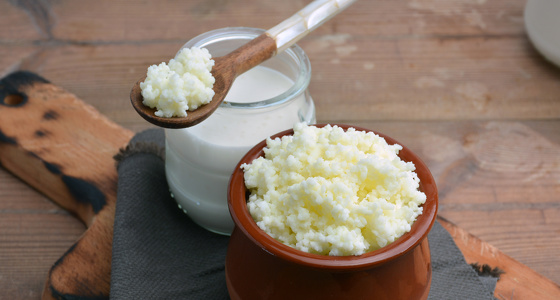
Can probiotics help with Crohn's disease & ulcerative colitis? We take a look at the evidence and some of the probiotic supplements available to buy.
Our gut bacteria is currently a hot topic among researchers and doctors alike. We are only just starting to understand the relationship between having a balanced microbiome (our collective gut microbes and their genes) and our health. New studies and discoveries are happening all the time and as a digestive condition inflammatory bowel disease (IBD) is frequently talked about in relation to our microbiome.
As a result of all this dozens of probiotic supplements - which when ingested may have a beneficial impact on our digestive and overall health aim to populate your gut with friendly bacteria that you might be lacking in - have come onto the market and many of them are targeting people with IBD.
In this section we examine what probiotics are available and present the current evidence available in relation to IBD and the use of probiotics.
Probiotics are supplements containing microbes that when taken in adequate amounts provide benefit to us and our health. Probiotics can help support the bacteria that live within us, especially when our bacteria are challenged, for example by antibiotics, poor diet or travelling. It is believed that many people (not just those with IBD) have unbalanced gut bacteria - which may be due to a number of reasons. Some of these reasons include:
When taken - usually as a drink or capsule - probiotics may help to support our gut health. We used to think that probiotics ‘repopulated’ the gut but now we know that they do not actually take up residence, but instead they have an impact as they move through our digestive tract. You can learn more our gut microbiome in this article.
When buying probiotic products it’s important to understand that not all probiotics are the same. They do not all contain the same strains of bacteria, they have all been manufactured differently and they all deliver the bacteria to the gut in different ways.
It’s not known exactly how many different strains of bacteria live in our guts - but it’s a lot (we are talking trillions!). Manufactured probiotic supplements tend to focus their products on just one or a few strains they believe will be the most beneficial for us.
When making a probiotic the manufacturer has to grow the strains of bacteria they want in their product (or buy them from another manufacturer that does this). This can be a very complicated process. Once grown the bacteria needs to be prepared for the probiotic. In general the bacteria in capsule probiotics is freeze-dried, leaving a powder which can be encapsulated. As bacteria are delicate and sensitive to extreme conditions special steps have to be taken during this process to ensure the bacteria isn’t damaged. Steps also have to be taken to ensure the bacteria will survive once encapsulated and also survive the harsh environment of our digestive system to make it into the small intestine. Probiotic companies often do this by mixing the bacteria with digestive enzymes and soluble fibre.
For liquid probiotics the bacteria, once cultivated, is added to the liquid (usually water or dairy) rather than being encapsulated.
Researchers are starting to think that imbalances in our gut microbiome are linked to many diseases, ailments and even our mental health.
There is increasing evidence that suggests intestinal microbiota plays a role in initiating, maintaining and determining the characteristics and development of IBD1, 2. And, some people with IBD do report that taking probiotics can help with easing some of their symptoms.
However, studies into the effectiveness of probiotics on people with IBD are limited. There have been a few studies into specific strains of bacteria and their effect on IBD and even fewer studies specifically testing probiotic products on IBD. Generally, at the moment, the research shows that some specific probiotics may be helpful for people with ulcerative colitis but the evidence in Crohn’s Disease is less convincing.
Some of these studies include:
Probiotic product specific
Symprove and ulcerative colitis. The study found that 76% of those with ulcerative colitis taking part in the study had significant reductions in faecal levels of calprotectin5.
Bacteria strain specific
Saccharomyces boulardii and Crohn’s disease. Results suggested that ‘Saccharomyces boulardii may represent a useful tool in the maintenance treatment of Crohn’s disease’6.
Saccharomyces boulardii and ulcerative colitis. The study’s ‘preliminary results suggest that S. boulardii can be effective in the treatment of ulcerative colitis’7.
OpticBac Probiotics have a product which just includes Saccharomyces boulardii.
No. Unfortunately there is currently no cure for IBD.
However, some people have found that some probiotics assist in alleviating some symptoms of their IBD. If you choose to take a probiotic it is recommended you do so alongside any other treatment you are undergoing and that you discuss taking it with your doctor before starting.
People who report success with probiotics have found a reduction in symptoms such as bloating, diarrhoea, fatigue, skin conditions (such as eczema) and constipation. Probiotics are increasingly being recognised to help people who have irritable bowel syndrome. Many people with IBD suffer from IBS too.
The success rate varies from person to person and a probiotic that may produce results for one person may not do the same for another.
Again, this really varies from person to person. Some people who take probiotics - whether they have IBD or not - report feeling bloated and gassy or have a short bout of diarrhoea at the beginning. This may be a reaction to the changes in bacteria in your gut. To help prevent this some probiotic companies recommend you start by taking a small dosage and build up to taking the full dose to allow your body to adjust. If you are concerned, or these symptoms persist, you should stop taking the probiotic and speak to your doctor.
Caution should be taken around taking probiotics when you are on immunosuppressant medications or are acutely unwell - always speak to your doctor before starting a probiotic to check it is safe for you to do so.
Manufactured probiotics available generally fall into three types:
Unfortunately there isn't one probiotic that works for all. It is very individual as to whether probiotics will make a difference to you, depending on your gut health.
Probiotics can be expensive and there are dozens available to buy. They are all of varying quality and some are bought from a common distributor and rebranded by the company selling them. Some brands of probiotic do have clinical research available into their finished products in relation to IBD, but most do not.
Due to the cost of probiotics it’s worth spending some time doing research into them, such as the claims they make and the clinical research behind their product, before buying them. You may also find the experiences of other people with Crohn's disease and ulcerative colitis who use probiotics useful in making your choice.
The success (or not) you have with probiotics will be very individual and if you find that one product doesn't work for you it doesn't mean that none of them will. Unfortunately you may have to go through a process of trial and error to see if they are of benefit to you.
Some people opt to do gut health testing to get an analysis of the bacteria in their gut before starting a probiotic. This involves sending a sample of your poo off to a lab to be analysed. At the moment comprehensive gut health testing isn't available on the NHS so if you want to do this you will need to pay privately.
There are various companies that offer this service, including Healthpath which offers three types of gut health test*. Along with your results, many of the companies will also provide a report and some will also offer recommendations.
Probiotics must list on their labels what’s in them, including the strains and any other ingredients added.
On a product, a probiotic strain should be listed as a long name followed by a series of letters, and sometimes numbers too. For example, Lactobacillus Rhamnosus GG, or Bifidobacterium lactis HN019.
The first part of the name (for example Lactobacillus, or sometimes just referred to as L.) is the genus. The second part of the name (for example rhamnosus) is the species and the letters and numbers at the end are the strain designation.
If you know what the name of each strain in the probiotic is you can link it to any research that’s been done into the strain.
Some companies produce a Trademarked name for strains of bacteria in their products. This can be for marketing purposes and isn’t an indication of one strain being better than another. If a product contains a Trademarked strain the packaging must still list the scientific name for the strain.
If a probiotic does not list the full name of the specific bacteria in the produce or they do not state how much of the bacteria is present in the product this is a sign to be wary.
Make sure the product contains at least the level of probiotics that was used in the research. These are shown as CFU (colony forming units - the number of viable bacteria in the product) on the bottle/packaging/website. Most successful probiotic research has used more than or equal to 109 (10 with 9 zeros!) CFU per dose so this is the amount of that bacteria needed to have the beneficial outcome shown in the study.
In the UK most probiotics are governed under the same laws as foods, not medicines, and governing bodies include the European Food Safety Authority (EFSA), the Food Safety Authority (FSA) and the Advisory Committee on Borderline Substances.
These bodies issue guidelines around what probiotic companies can say in relation to their product and health claims they can make. Even if a probiotic has medical evidence to support its use for a certain condition they cannot publicise this unless they go through strict medical testing - a very expensive and lengthy process.
This is why you will often find that probiotic companies do not mention specific health conditions on their website and marketing material. Guidelines have also been issued to say that the term probiotic may no longer be used in the promotion of supplements by the companies. The Advertising Standards Authority also has oversight regarding claims made and any complaints arising. In general the industry is self-regulated so some companies choose to ‘bend’ the rules around making health claims in relation to their product.
Probiotic and fermented foods are foods that contain live bacteria. However, unlike commercial probiotics the exact strains and amount in the product aren’t known.
Common food sources of probiotic bacteria include:
These can either be made at home or shop bought. Learn more about probiotic foods, including some recipes.
*Please note this is an affiliate link which means if you buy from the company we may receive a commission. You will pay the same price and any commission gained will be used to support IBDrelief's work.

